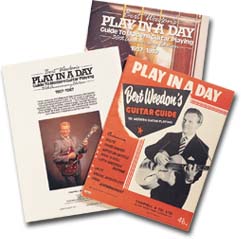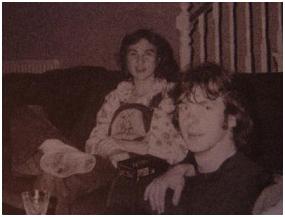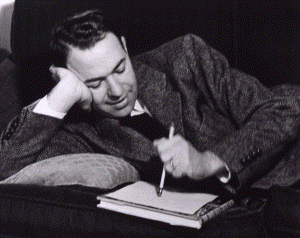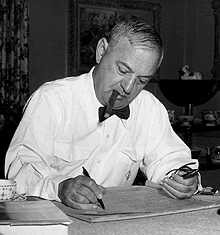
| site index |
 - it's true, it teaches you how to play a song called "Sinner Man" in A minor and E minor (it only has two chords) - this kind of idea is, of course, fatal for the world, because it makes you believe that you're a guitarist, and there are many, many people who call themselves guitarists (they ought to have a different name, until they get to a certain level, like Jeff Beck or John Williams - associate guitarists, if you like...) anyway, I was doing this to keep up with my friends, and to impress the various young women about the place, and if you add this to the stuff I was doing with my computer (running the record statements, sales figures, etc.) I was amazed to see how much money could be earned from records - it occurred to me that to make a few quid you either had to invent something , one thing, like a tin opener, that lots of people could buy, that they couldn’t do without, or you had to write songs...eventually, I walked into my boss’s office and announced that I was going to be a songwriter! I remember he said, “Well, that’s very nice, Peter, your job will be here when you want it back!”...So, I would have crawled over broken glass rather than go back to that pompous bastard...!
- it's true, it teaches you how to play a song called "Sinner Man" in A minor and E minor (it only has two chords) - this kind of idea is, of course, fatal for the world, because it makes you believe that you're a guitarist, and there are many, many people who call themselves guitarists (they ought to have a different name, until they get to a certain level, like Jeff Beck or John Williams - associate guitarists, if you like...) anyway, I was doing this to keep up with my friends, and to impress the various young women about the place, and if you add this to the stuff I was doing with my computer (running the record statements, sales figures, etc.) I was amazed to see how much money could be earned from records - it occurred to me that to make a few quid you either had to invent something , one thing, like a tin opener, that lots of people could buy, that they couldn’t do without, or you had to write songs...eventually, I walked into my boss’s office and announced that I was going to be a songwriter! I remember he said, “Well, that’s very nice, Peter, your job will be here when you want it back!”...So, I would have crawled over broken glass rather than go back to that pompous bastard...!  I did actually do the year of starving and living off chip sandwiches etc., and then I got very lucky and met a guy called Ian MacDonald, and went on to join a band called King Crimson...the rest (fortunately for me) is history...that sounds rather simplistic, the way I did that, because of course there were very many elements that went into making this happen...I must mention here that my mother’s influence probably played a part in all this, she being an unconventional, bohemian type of person - she used to go down to the East End to join the anti-fascist marches and rallies, and no doubt she inspired in me a sense of justice and freedom and such values, which on top of all the other traits in my character, youth, sexuality, energy etc. actually fuelled the songwriting and poetry, provoking thought and rhyme; I think it’s terribly important, that you have an underlying motor that drives you along, be it anger and/or passion of life for this work , as well as a certain talent for understanding words and their reason for being written, and to be written excellently...there is no point in doing it in any way less - most of which one writes first off (unless you are a Shakespeare or Hans Christian Anderson(!) is less than best - I usually assume that the first thing I write is rubbish, which is a good yardstick, if you like, and only good for working on further...there are two ways of doing this - either to keep on polishing the original, until it’s so good that it’s impossible to improve, or to rather start in the middle and work outwards, so to speak, towards the first and last verse - it sounds strange, but I actually did this with a song with Andy Hill - we wrote the first verse in ten minutes, and then two and a half weeks to do the next two verses! This happens a lot, ‘cos you get the initial inspiration, and then, as somebody once said, it’s all down to ‘perspiration’!
I did actually do the year of starving and living off chip sandwiches etc., and then I got very lucky and met a guy called Ian MacDonald, and went on to join a band called King Crimson...the rest (fortunately for me) is history...that sounds rather simplistic, the way I did that, because of course there were very many elements that went into making this happen...I must mention here that my mother’s influence probably played a part in all this, she being an unconventional, bohemian type of person - she used to go down to the East End to join the anti-fascist marches and rallies, and no doubt she inspired in me a sense of justice and freedom and such values, which on top of all the other traits in my character, youth, sexuality, energy etc. actually fuelled the songwriting and poetry, provoking thought and rhyme; I think it’s terribly important, that you have an underlying motor that drives you along, be it anger and/or passion of life for this work , as well as a certain talent for understanding words and their reason for being written, and to be written excellently...there is no point in doing it in any way less - most of which one writes first off (unless you are a Shakespeare or Hans Christian Anderson(!) is less than best - I usually assume that the first thing I write is rubbish, which is a good yardstick, if you like, and only good for working on further...there are two ways of doing this - either to keep on polishing the original, until it’s so good that it’s impossible to improve, or to rather start in the middle and work outwards, so to speak, towards the first and last verse - it sounds strange, but I actually did this with a song with Andy Hill - we wrote the first verse in ten minutes, and then two and a half weeks to do the next two verses! This happens a lot, ‘cos you get the initial inspiration, and then, as somebody once said, it’s all down to ‘perspiration’! 
 Now I’ve rambled on enough, so at this point I’d like to give some examples; first, I have a book about a man called EY "Yip" Harburg - now, Yip wrote “Somewhere Over The Rainbow”, which is a very beautiful song, but more importantly, he also wrote "Brother, Can You Spare Me A Dime?" which is actually a very left wing, socially aware, humanitarian kind of song - in fact, when Bing Crosby sang it, it was banned from the radio, because of the lyrics - he also wrote “April In Paris”, which is musically very beautiful - the thing about the latter is that it only has about sixty nine words, with no real chorus, and it peaks only once without repeat - a very unusual song, really...anyway, I would say that with songwriting, until you know the rules you can’t really break them - once you do know them it’s an awful lot of fun breaking them, and gives everything a lot more validity - this very much applies to songs, as to whether you have half rhymes that work or don’t, or how you can twist them (how you can do things with the grammar, changing nouns into verbs etc...) and cheat rotten...! but you should have an underlying theory of why you are doing this, rather than from a state of sheer ignorance, and this generally applies to the English popular song, as opposed to rap music (though I must add that since i”m not black and from Chicago, I don’t listen to it that much - it’s not my genre...although I did write a couple of rap songs way back before it was generally done - there was a thing called talking blues - Bob Dylan did a bit and there was also a guy called Rambling Jack Elliot, back in the late fifties, and they did songs with a sort of boogie bass and a rhythm rap over the top - it was just folk music played with rhythm guitars, so today’s rap is not necessarily new - there is nothing ‘new’ under the sun - it just gets changed around to reflect its time, and have the energy and angst of its time and rhythm . . .
Now I’ve rambled on enough, so at this point I’d like to give some examples; first, I have a book about a man called EY "Yip" Harburg - now, Yip wrote “Somewhere Over The Rainbow”, which is a very beautiful song, but more importantly, he also wrote "Brother, Can You Spare Me A Dime?" which is actually a very left wing, socially aware, humanitarian kind of song - in fact, when Bing Crosby sang it, it was banned from the radio, because of the lyrics - he also wrote “April In Paris”, which is musically very beautiful - the thing about the latter is that it only has about sixty nine words, with no real chorus, and it peaks only once without repeat - a very unusual song, really...anyway, I would say that with songwriting, until you know the rules you can’t really break them - once you do know them it’s an awful lot of fun breaking them, and gives everything a lot more validity - this very much applies to songs, as to whether you have half rhymes that work or don’t, or how you can twist them (how you can do things with the grammar, changing nouns into verbs etc...) and cheat rotten...! but you should have an underlying theory of why you are doing this, rather than from a state of sheer ignorance, and this generally applies to the English popular song, as opposed to rap music (though I must add that since i”m not black and from Chicago, I don’t listen to it that much - it’s not my genre...although I did write a couple of rap songs way back before it was generally done - there was a thing called talking blues - Bob Dylan did a bit and there was also a guy called Rambling Jack Elliot, back in the late fifties, and they did songs with a sort of boogie bass and a rhythm rap over the top - it was just folk music played with rhythm guitars, so today’s rap is not necessarily new - there is nothing ‘new’ under the sun - it just gets changed around to reflect its time, and have the energy and angst of its time and rhythm . . .  But I digress...to get back to our main point, Ira Gershwin wrote “that a period of development and adjustment was always inevitable for the fledgling lyricist” - this also applies to songwriters as well, but particularly to lyricists - and he goes on, “Given a fondness for music which one assumes that one has, a feeling for rhyme, and a sense of whimsy and humour, an eye for the balanced sentence, an ear for the current phrase...”(this is very important, because there are various words and phrases which get used and abused, and simply don’t work out of their specific era, which is why you must research current magazines and books, and listen to how people speak, in the street and colloquially - this is also relevant to music - of course, you can take from the past, but try and be a bit brave and bend it a bit here and twist it about there - a jazz guitarist once told me that the “problem” with playing old Beatle songs was that the chords were all “wrong”...?! Ira went on to say that “the ability to imagine oneself as the performer” (if you are writing for someone else to perform) is very important...I think I always did that, though I don’t like to think small...I see a spotlight and a stadium....yes, nothing less...I’m sorry, I’ve been spoiled...! Actually, stadiums can be pretty boring - Greg Lake used to point out to me while we were writing together that he had to stand out in front of fifty thousand people and make them believe what he was saying, albeit temporarily - they have to be taken by what he’s singing -I read something relating to that in a book about films, called “Adventures In The Screen Trade” by William Goldman - a fantastic book, which I recommend highly if you haven’t read it - he was a screen writer - he wrote “Butch Cassidy and the Sundance Kid” (which he had on the shelf for eight years, by the way) and he says that when writing for certain lead actors and actresses you have to “make them look good” - I don’t necessarily go along with that way of thinking - it’s too “safe” and “bland” to not disturb anybody - in fact, I always try and slip in a couple of edgy lines, slightly more political lines etc., to wake people up...Ira continues . . .
But I digress...to get back to our main point, Ira Gershwin wrote “that a period of development and adjustment was always inevitable for the fledgling lyricist” - this also applies to songwriters as well, but particularly to lyricists - and he goes on, “Given a fondness for music which one assumes that one has, a feeling for rhyme, and a sense of whimsy and humour, an eye for the balanced sentence, an ear for the current phrase...”(this is very important, because there are various words and phrases which get used and abused, and simply don’t work out of their specific era, which is why you must research current magazines and books, and listen to how people speak, in the street and colloquially - this is also relevant to music - of course, you can take from the past, but try and be a bit brave and bend it a bit here and twist it about there - a jazz guitarist once told me that the “problem” with playing old Beatle songs was that the chords were all “wrong”...?! Ira went on to say that “the ability to imagine oneself as the performer” (if you are writing for someone else to perform) is very important...I think I always did that, though I don’t like to think small...I see a spotlight and a stadium....yes, nothing less...I’m sorry, I’ve been spoiled...! Actually, stadiums can be pretty boring - Greg Lake used to point out to me while we were writing together that he had to stand out in front of fifty thousand people and make them believe what he was saying, albeit temporarily - they have to be taken by what he’s singing -I read something relating to that in a book about films, called “Adventures In The Screen Trade” by William Goldman - a fantastic book, which I recommend highly if you haven’t read it - he was a screen writer - he wrote “Butch Cassidy and the Sundance Kid” (which he had on the shelf for eight years, by the way) and he says that when writing for certain lead actors and actresses you have to “make them look good” - I don’t necessarily go along with that way of thinking - it’s too “safe” and “bland” to not disturb anybody - in fact, I always try and slip in a couple of edgy lines, slightly more political lines etc., to wake people up...Ira continues . . . 




|
return to page index
site index |
|
return to page index
site index |
|
return to page index
site index |
|
return to page index
site index |
|
return to page index
site index |

|
~ site index ~ Lyrics | Recordings | Gallery Haikus | Poems | On Songwriting SSOS Multimedia | For Amusement Only | Links & Lists What's New | Promenade the Puzzle |

|

Sign
the Dreambook
![]() Read
the Dreambook
Read
the Dreambook
- email -
|
Peter Sinfield songsoup42 at yahoo dot com |
|
Jon Green (webmaster) jrgreen73 at yahoo dot com |
 Arachnophilia
Arachnophilia